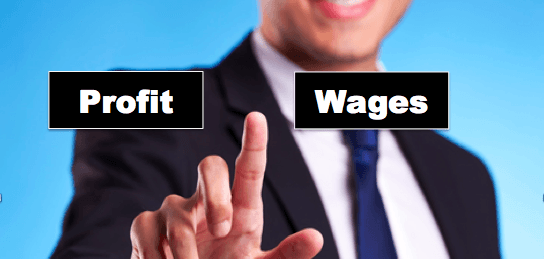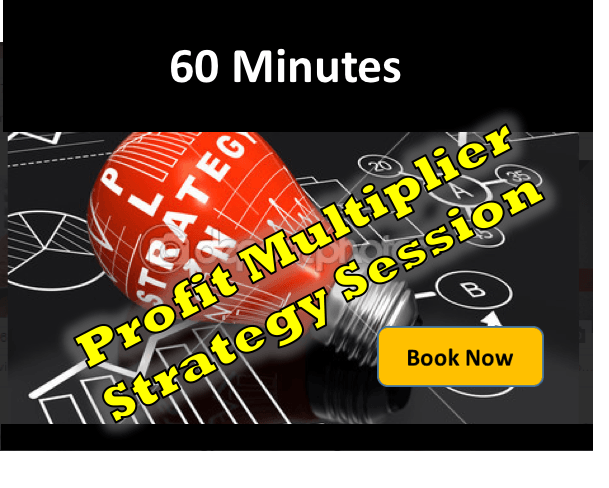Profits or Wages – Wimbledon Accountant
I was at a workshop recently, talking to the dozen business people about business excellence, and running a better business.
One of the detailed conversations I had was with a business owner who ran a small business in Hertfordshire.
Here is a bit of history about their business.
- It had been trading for over five years.
- He was the only employee, but had tried hiring a while ago, with the new employee leaving six months later without notice.
- He was complaining that it was expensive to hire a new employee and train them in his methodology.
- He was passionate about his business.
- He was looking to franchises business, so that he did not have to employ a new employee, and go through the expense/disappointment he had just undergone.
- He was suffering from a lack of time, busy earning money every day, and doing the administration and bookkeeping in any spare time and weekends.
- He was busy documenting his systems and methodology in readiness for selling his first franchise to a franchisee.
- He was expecting this process to take a couple of years.
- Alarmingly, his life partner had sold her flat to raise money to finance the venture.
- Even more alarmingly, he did not know with any degree of accuracy how much money they were making.
- His belief was that he was making profits. Is evidence for this was no more than the fact that he was managing to pay his bills.
With those facts, what are your thoughts? What questions are raised in your mind?
There are a host of observations that come to mind.
Lesson one
Let’s start with profits or wages.
In many owner managed businesses I work with, there is a great deal of confusion between the owners salary, and profitability. The reason for this is probably the fault of us accountants.
You see, to minimize tax bills, we minimize the salary for the owners, and pay income through dividends. For self employed, there is not option for owner salaries either). This is not only tax efficient, but also very flexible. And you do need to make a profit to pay dividends.
In most cases, profits only exist because there are no salaries for the directors.
If you entered the notional salary that the director would be entitled to, for his hard work, long hours, high stress, heavy responsibility and skill, at a realistic market rate, is likely that they would be no profit at all.
It is more likely that they will be a loss in more than 80% of cases that I have experienced.
If you would like to review the simple case study, click here.
I use this case study to wake my clients out of the hypnosis they may be in. If they think they are making profits, they will be comfortable not changing what they do, and how they do it.
Once they see that, with notional salaries, they are making little or no profit, it is a wake-up call, to do something different. And do it quickly.
Lesson two
Besides the fact that he had not taken into account the notional salary, he had no records of his profitability. Whether he was making enough money to take on an employee or impress a franchisee was non-existent.
Franchisees are required to report the monthly income to the franchisor. Clearly he could not have a system for reporting monthly income, as he did not do this for himself.
Unfortunately, this type of thinking and lack of financial control is common most of Owner Managed Businesses (OMB). They do not realize that, had they maintained decent financial control, they would be motivated to make more money. They would also be able to take evasive action if danger reared its ugly head. A recession or a new competitor, for example.
Lesson three
Another problem identified from this case study, is that many owner managed businesses in the 1st world, avoid taking on employees because they have had one or more terrible experiences with this process before.
This will often restrict their growth, and their potential.
Lesson four
He was documenting his systems, and allowing two years for this process. This means that he would be unable to progress his business, on his chosen business model, for two years.
When I first undertook this process in my business 35 years ago, it took me seven years. Today, with my awareness of the road bumps, and processes,, alongside modern digital software, we can have this done in under six months.
This would accelerate his progress fourfold.
Lesson five
His passion for his business was causing him to carry on blindly, rather than reviewing his business model afresh.
In a previous blog/post I discussed the potential for accurate thinking. This is an excellent example of careless thinking. Or an example of the entrepreneur mindset as described in my international bestselling book “Profit Propeller”.
Lesson six
If it is too expensive to hire an employee and train them, this is nothing compared to finding a new franchisee and bringing them on-board, with all the systems.
Many franchisors make their money by selling the franchise, rather than helping the franchisee make more money, and taking a percentage. He was adamant he did not want to do this. Yet he was demonstrating a clear lack of ability to help them achieve this greater success, from results within his own business.
Lesson seven
His lack of time, was a function of his poor organization skills on anything other than the client facing work. His appointment system, his bookkeeping processes, his invoicing processes, were all time heavy. They were not scalable.
Lesson eight
If they were making money, like he thought, he would not have needed his life partner to sell her property for expansion.
On his own admission, he was over two years from finishing documenting his systems and processes.
Had they held onto the property and rented it out, in the two years, in leafy Hertfordshire, the now disposed of property would have gone up at least 5%. At least five times the amount they would get from a bank on deposit. And the rent may have produced a contribution.
Summary
In summary, here are my key recommendations with the background of this case study: –
Examine, and have tested, your business model with someone independent. If you think it is expensive to do that, consider how expensive it is not to.
Get control over your financial data. The information you get will allow you to make better decisions, and respond faster to challenges and opportunities.
Outsource as much of your admin and accounting. You can make much more money doing what you’re good at, then doing this type of work. If you love it, do it during your hobby time, and call it a hobby.
Take a reality check on a regular basis, but putting a notional salary based on the facts I’ve described above. To not short-change yourself on this exercise. As an entrepreneur, I know you have broad shoulders. Use it here… it will pay you dividends.
Start off by hiring part-time, with clear training prepared and recorded on your first hire. That way, if the person leaves, the next recruit can be trained 10 times faster, and 10 times cheaper. I remember when my children were taking holiday jobs, they were often asked to do one day free as part of their training. Just an example of giving the training time covered by the employee, not you.
Only hire if your data can demonstrate that you can find work to fill that persons time and cost. Here again, your data will help you make better decisions, and save you heartache in the future.
Before you take significant steps like selling a property to undergo a new venture, take advice from someone who is far more successful than you. Although this is a cost, it is often much less than the cost of not taking advice.
Do you have any other lessons you have picked up from this case study? Please leave a comment below, and let’s develop it further.




